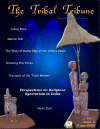Nature Talk
|
Time and again, the educated people and media, toss a question, whether the tribal communities in India, are Hindu or not. This question has divided the intellectuals; some are overzealous in establishing that the tribals are originally Hindus.. The Christianity, which arrived at India at a much later date, tried to expand their religion by converting the economically deprived tribal and similar communities into their fold. History informs us that the religious faiths did spread with active or passive backing of the rulers. Islamic faith received patronage in mediaeval period and Christianity got the similar support in colonial rule. The believers in the concept of Hindu Rashtra, when in power, obviously look forward to the expansion and protection of Hindu religion and make efforts to bring back the Christian tribals to the Hindu fold. Anthropologically arguing, each tribal community believes in one Supreme Divine authority, termed variously in their own dialects. Legends and myths explain their origin. Besides the ‘Supreme’, they appease various gods and goddesses affiliated to streams, hills, forests, animals, celestial energies etc. In the Hindu religious belief and practices, nature worship is included and for each, a presiding deity is assigned. Lord Shiva is propitiated in the form of ‘linga’ or idol, ‘Laxmi’ as sheaves of corn or treasure pot of cowries and so on. During long long course of interaction between the ‘adivasi’ and the late ‘ incomers’ with Vedic rites, many ritual items have been exchanged. Human societies are not enclosed by impenetrable boundaries. Many sections of ‘adivasi’ amalgamated with the latecomers, and thus Indian subcontinent got her population of biological and cultural diversity. The Hindu religion is a way of life and it incorporates many faiths and rituals. Nobody needs to be converted or initiated to be Hindu. The tribal ryots of Hindu rulers joined Hindu festivals and at the same time performed worship of their own gods. But the Christian tribal people, once for all shun all traditional tribal rituals and follow church rule. This has created dichotomy in religious practices leading to social distinction in the tribal habitat, paving the way of the Hindu campaign. The present Hindu society is heterogeneous in composition, as it absorbed many elements from the ancient societies existing in India and from those who arrived at later stage albeit prior to the advent of Christianity and Islam. It is wise to leave each community to live with their own traditional values and belief. Interference in their religious philosophy in the name of development or politics will amount to infringement on their liberty. |
Photographs :
References :



